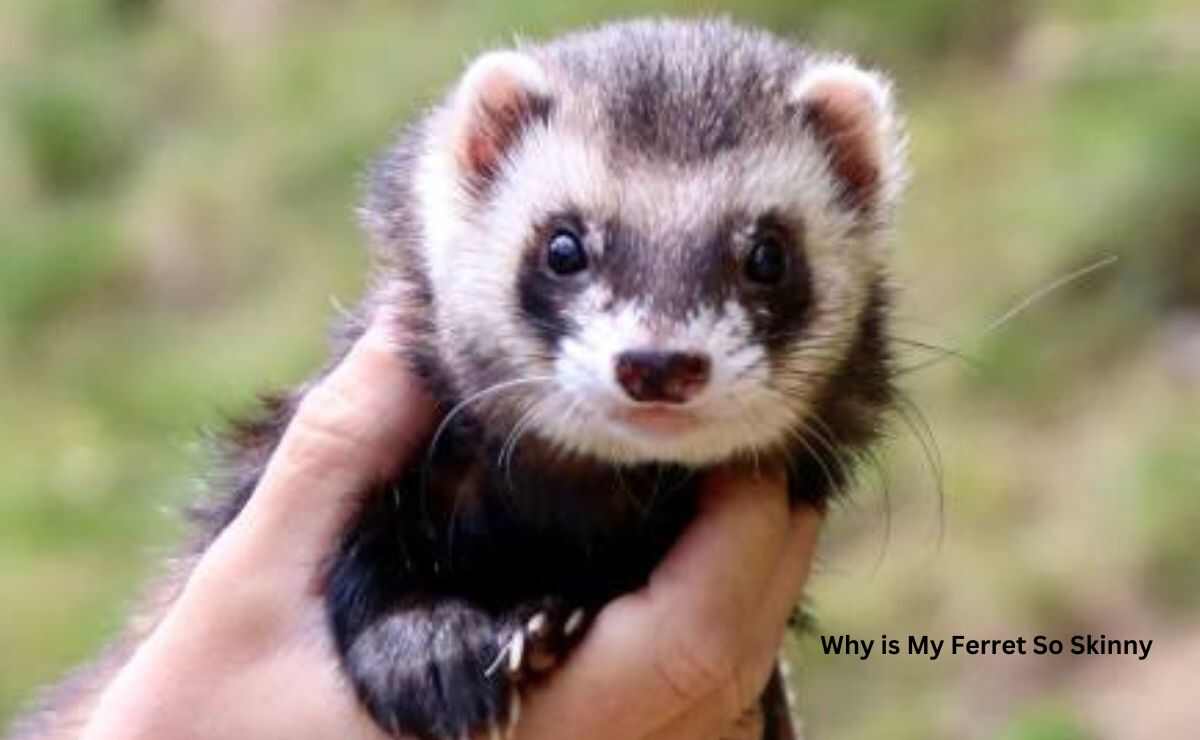Ferrets are typically a very healthy breed of pet, but sometimes things can go wrong. In this blog post, we’ll discuss about the question why is my ferret so skinny by mentioning common causes of skinny ferret and how you can help your ferret regain its lost weight.
We’ll also provide advice on how to monitor your ferret’s weight and nutrition so that it remains healthy and happy. So, if you’re worried about your ferret’s health, read on to learn more about the common causes of underweight in ferrets and how to address them.
Why is My Ferret So Skinny?

There are a variety of reasons why a ferret may be thin, ranging from dietary problems to health issues.
If you are concerned about your ferret’s health and would like to get him or her checked out by a veterinarian, the best way to do that is to bring your ferret in for an appointment. At the appointment, the veterinarian will be able to examine your ferret and determine the cause of the thinness, which may include a variety of factors such as diet, health problems, or environmental stress.
In most cases, however, a definitive diagnosis can only be made through additional testing and examination. If you are unsure whether your ferret is healthy or has any health issues, it is always best to consult with a veterinarian.
There are a few potential reasons for a ferret’s thinness, including:
- Ferrets may be eating less than usual due to a lack of food resources or a change in their environment.
- Ferrets may be experiencing health problems that are affecting their appetite and digestion, such as intestinal parasites or parasites in the respiratory tract.
- Ferrets may be losing weight due to an underlying medical condition, such as anemia or malnutrition.
- Ferrets may be unable to digest some types of food, such as grains or soy, which can lead to weight loss.
- Ferrets may be experiencing stress or anxiety, which can lead to overeating and weight loss.
If you notice that your ferret is becoming thin and is not responding to the usual diet and nutritional supplements, it may be best to see a veterinarian for a diagnosis and treatment plan. In some cases, the symptoms of thinness may be indicative of a more serious health problem and require prompt attention.
Is it normal for my ferret to be skinny?
Ferrets are typically slim and fit because they have a high metabolic rate and require a lot of food to maintain their weight. Ferrets that are not maintaining their weight may become thin and weak, which can lead to health problems such as diabetes or kidney disease.
Often you may find your ferret skinny and weak. It is important to keep your ferret fed and well-nourished and provide them with the appropriate amount of exercise to prevent them from becoming thin and unhealthy. If you notice that your ferret is becoming thin or unhealthy, please consult your veterinarian for advice on how to address the issue.
How do you fatten up a skinny ferret?
To fatten up a skinny ferret, you will need to provide it with a healthy diet and plenty of exercises. Without providing healthy diet you may find ferret losing weight but still eating. A good diet for ferrets includes fresh vegetables and fruits, whole grain products, and low-fat proteins.
Ferrets also need plenty of room to run and play, so providing them with a large cage or yard is ideal. In addition to a healthy diet and plenty of exercises, ferrets also need to be kept warm during the winter months.
However, some other tips that may help include:
1. Feed the ferret a high-quality diet that includes plenty of fresh vegetables and fruit.
2. Provide the ferret with plenty of exercises – a vigorous game of fetch or a long walk outdoors, allow to climb trees, are good options.
3. Monitor the ferret’s weight regularly and adjust its diet accordingly. If the ferret begins to lose weight or becomes sluggish, increase its food intake or add more exercise to its routine.
4. Always keep an eye on the ferret’s health – if it starts to exhibit any signs of illness, such as excessive drooling or difficulty breathing, take it to a veterinarian for examination and treatment.
Do ferrets like wet or dry food?
Ferrets are obligate carnivores and as such require a diet that is high in protein and low in carbohydrates. Ferrets typically prefer wet food, which is typically made from meat, fish, poultry, or eggs that have been cooked and then mixed with water or milk.
Ferrets also enjoy some fruits and vegetables, but they should not be the only source of nutrition in their diet. Ferrets should be fed twice a day, morning and night, and the amount of food they eat should be based on their weight and activity level.
What can I give my ferret for protein?
The best option for your ferret’s protein needs will depend on its age, weight, and activity level. You should also make sure that the food you give your ferret is nutritionally balanced and contains the appropriate amount of protein and other nutrients.
It is important to consult with a veterinarian or pet nutritionist if you are not sure what type of food or treats to give your ferret. In general, providing a variety of high-quality protein sources will help ensure that your ferret is getting the nutrients it needs to stay healthy and active.
There are a number of options available for providing your ferret with protein, including:
1. Feeding them raw meat or raw poultry. Ferrets are obligate carnivores, and as such, they need a source of protein to fulfill their nutritional needs. Raw meat and poultry is the best option for providing this essential nutrient.
2. Feed them specially-made ferret food pellets. These pellets are high in protein and other essential nutrients, and they provide your ferret with the nutrients it needs to thrive.
3. Feed them small amounts of cooked chicken or meat once or twice a week. Cooked chicken or meat is easier to digest than raw meat, and it provides your ferret with all the essential nutrients it needs to thrive.
4. Feed them a diet that includes both raw meat and cooked chicken or meat. This diet provides your ferret with the best of both worlds – plenty of protein from raw meat, without the risk of gastrointestinal problems caused by eating raw meat straight from the animal.
What foods are toxic to ferrets?
There are a few foods that are toxic to ferrets, and it is important to be aware of the risks so that you can keep your ferret safe. Some of the foods that are toxic to ferrets include:
1. Raw or undercooked meat
2. Eggs
3. Dairy products (milk, cheese, etc.)
4. Garden vegetables or fruits that are not cooked
5. Chocolate
6. Alcohol
It is important to monitor your ferret’s diet and make sure that they are eating a nutritious and safe diet. If you notice any signs of toxicity, such as vomiting, diarrhea, or seizures, it is important to immediately take your ferret to the veterinarian for further examination and diagnosis.
By being aware of the food items that are toxic to ferrets and monitoring their diet, you can help protect them from possible health complications.
Conclusion
Everyone loves their pet. Love and care stay together. So, if you love your ferret then you must care for your ferret.
If your ferret becomes skinny then you must be worried. But the condition of your ferret is not a permanent situation. So, try to keep going to improve the health of your pet ferret.
